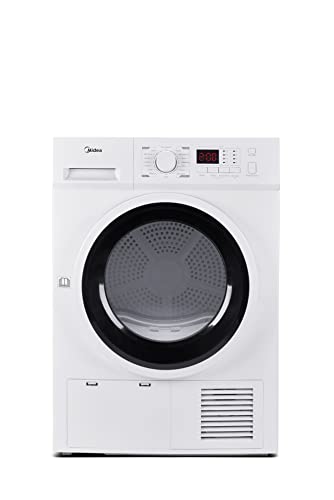The 10 Most Terrifying Things About Dryers Heat Pump

Why Buy a Dryer With a Heat Pump?
Like conventional gas or electric dryers, heat pumps warm air, and then pumps it into the drum. The warm air isn't forced into the vents, which could cause problems like clogged filters for lint and energy waste.
Ventless heat pump dryers can be set up anywhere, as they cool the air and eliminate moisture. Find out more about their advantages.
Energy Efficiency
While traditional vented dryers require massive amounts of energy to run, heat pump dryers use only a small amount of energy. They don't require heat like conventional dryers. They rely instead on a closed-loop refrigerant loop system, similar to an air conditioner. The air that flows through the evaporator coil of the dryer warms it and absorbs moisture. This moisture drips into a tray which can either be manually emptied or connected to a drainage pipe. The cool air then flows through the coils to begin the cycle.
The result is that heat pump dryers consume around two-thirds less electricity per load than conventional dryers according to Energy Star. They also require no venting and eliminate the possibility for lint accumulation within dryer vents, thereby reducing the risk of fire. Ventless dryers can be used in any room that has an electrical outlet. This makes them ideal for apartments and other small spaces.
The efficiency of energy used by heat pump dryers can also translate into lower utility bills. This is especially important considering the rising price of electricity. Despite the higher upfront purchase price of heat pump dryers, they typically pay for themselves in just two years because of their lower operating costs.
Electric heat pump dryers consume substantially less energy than condensing dryers which don't make use of heat pumps. Their cycle times are longer than conventional dryers.
If you're serious about reducing your energy use then a heat pump dryer is the best way to go. It's the most efficient way to do laundry and can be powered by electricity generated by solar or other renewable sources. If you're on the path towards an all-electric home, then a clothes dryer that is heated is a must in it. It can be powered by the same renewable energy sources as your other appliances such as washers and refrigerators. As such, it can aid you in achieving the of having a completely electric home by 2050.
Convenience
Many dryers that have heat pumps have moisture sensors to help prevent overdrying and save energy. Certain dryers heat pumps feature anti-wrinkle technologies and smart settings that can be controlled by smartphone. Some models that are ENERGY STAR certified models are able to recycle the water used to remove humidity from the air during drying, saving you money on disposal costs.
Heat pump dryers are also more flexible than vented and ducted dryers since they do not require venting. This makes them ideal for a variety in the home, including attics and basements. tumble dryers with heat pump is that they take longer drying clothes than traditional electric dryers because they don't make use of the same amount of heat.
Rather than using hot air to dry clothes, as conventional electric and gas dryers, heat pump dryers reuse the same air repeatedly again. A compressor presseurizes a coolant in one set coils to release heat. Then, it flows through an expander valve before flowing into a different set of coils in which it cools down and absorbs moisture. This cycle is repeated over and over until the load is completely dry. This is a more energy efficient method than traditional dryers which waste energy by heating air continuously to dry laundry.
The use of heat pump dryers may initially be costly, but they are a green option. But, they'll pay for themselves over time by reducing your utility bills. Many manufacturers offer incentives and rebates to offset the initial costs of a dryer that uses a heater.
Certain heat pump dryers require a drain hose to dispose of the water they use to evaporate moisture from the air, which can add to the total cost of the device. This isn't a major issue, however it could be a deal-breaker for some consumers.
Heat pump dryers offer many advantages that are worth considering. They are gentle on fabric, helping to prolong their life and look good in the process. They also cost less as they reduce your energy consumption by up to 28% compared with traditional dryers.
Durability
Designed to reduce energy costs by reusing heat from the air, these dryers are also more gentle on clothing and help prolong their lifespan. They utilize the same method as vented dryers to remove water from clothes, but they don't let humid air out of your home. Instead, they recycle warm air that has already been cool. They dry clothes more slowly than vented dryers, because they operate at lower temperatures.
They don't require vents and can be placed in any area that has water and electricity. These dryers are perfect for small homes, accessory living units (e.g. an apartment above the garage) and even additions. Some models are compact enough to fit in small spaces, and some can be stacked together with a washer for added flexibility. Larger ventless heat pump dryers which are eligible for the Energy STAR label, provide greater capacity.
These appliances tumble clothes in an heated drum, much as traditional vented dryers. The hot drum warms up as the clothes spin, and squeezes out moisture. The water is then stored in an additional tank or drain hose, which must be drained manually or by a system. Certain dryers require a tank to be cleaned every few cycles. Others have a self-draining tank that requires less maintenance.
Because they're more complicated than vented dryers they have higher repair costs and are more costly to service. Despite these drawbacks, these machines are worth the purchase for homeowners who wish to lower their utility bills and save money over time.
Your laundry habits as well as your budget are the most important factors to consider when deciding if you should purchase a heat-pump dryer. If you are a frequent user of laundry and want to get it dry quickly then a vented dryer would be the best choice for you. On the other the other hand, if you're searching for long-term savings and don't mind 2.5-hour drying times the heat pump dryer is an excellent choice. They can save you as much as $2,600 per year in energy costs, and last twice as long as traditional vented models.
Noise
The dryers that use heat pumps tend to be quieter than traditional dryers, however noise levels can differ between models and brands. Understanding the methods used to measure noise levels and comparisons between them can help customers choose the best model for their requirements. If noise is a problem it is recommended to schedule your dryer at off-peak times when sleep and household activities patterns will be less disrupted. The dryer could also be placed in a place that is less prone to vibration, and separated from the floor using rubber mats or anti-vibration pads.

The grinding and squeaking sounds can be a sign of an overloaded dryer drum that is struggling to rotate properly. To avoid this, be sure to follow the manufacturer's recommendations for load capacity and to avoid overfilling the dryer. It is recommended to balance larger items, such as comforters or blankets with smaller ones may improve performance and reduce the sound of squeaking.
The sound of the dryer's heat pump that gurgles is normal. It is an indication that it is working according to plan. If the sound gets louder or continues to recur it could indicate that your dryer's lint filters and vents are blocked and require cleaning.
Cleaning the lint filters regularly and dryer vents is essential to ensure the heat pump dryer performs properly. This will reduce the noise during drying and prolong the life of the appliance.
Certain dryers that use heat pump are advertised as operating on the standard 120-volt, 15-amp electrical circuits, which is a great option for those who reside in older houses with limited power outlets. This could be a deceitful marketing since most electric dryers require 220-volt circuits with 30-amps to work properly. Additionally, running a heat pump dryer on a standard circuit can increase the chance of fire or electric shock. It is recommended that an electrician with experience install a heater in an existing house.
